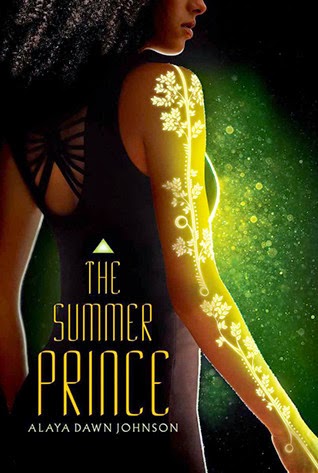
- Release Date: March 1, 2013
- Pages: 289
- Genre: Science Fiction
- Publisher: Arthur A. Levine (Scholastic)
June Costa is the best artist in Palmares Três, the lush futuristic pyramid city built a midst a post post-apocalyptic South America. June’s art has always been about expressing herself and the things she loves, but her street art takes on new heights when she teams up with Enki, the 17-year-old reigning summer king of Palarmes Três who, as dictated by tradition, will be sacrificed at the end of the year.
The Summer Prince is a fairly complex novel, there is just so much going on in this world and society I don’t even know where to begin. The world building can be a bit tough to get into, especially for someone like me coming from a Western world. Johnson’s world is so far from anything analogous to American society. The driving force of this novel is the tradition of the summer king; Palmares Três matriarchal society elects one boy to serve as the summer king alongside the Queen and he is sacrificed at the end of the year. The reasoning behind this tradition is a little fuzzy in the book, but this is based on some ancient South American traditions.
The main battle here is twofold; man vs technology and young vs old. In the novel, people are able to live to upwards of 200 years meaning young people are seen by their elders as extremely flippant and useless. Our protagonist June is a bit of a rebel who is starting to take issue with her city’s traditions and isolationist stance, while Enki is prepared to use his new position as summer king to critique the city’s caste system and incite a revolution of the young. When they team up it soon becomes a political battle between them and the city’s most powerful matriarchs.
This novel seems to split readers and I can see why…it’s definitely weird at first. It can take some getting used to the world and language of Palmares Três. Johnson throws you right in without a lexicon so, it took me a few pages to figure out what all the Portuguese words meant. Sexuality also appears to be a fluid between all the characters and sex doesn’t appear to be as much as a taboo topic. In fact, this book refers to sex more frankly than I’ve seen in most YAs.
Johnson’s writing style is beautiful, she has really crafted a world and a society that left me re energized and ready to leap back into dystopian fantasy novels. The Summer Prince is a standalone and I have to say there is something powerful about entering a world, experiences an intricate dynamic story and then just having it end in under 300 pages. While the ending isn’t open ended, it gives the reader room to interpret instead of solving the problem.
I will say, I was originally pushed to this novel because it always gets talked about in reference to diversity. I think diversity in literature in so important, especially YA, but sometimes…. I struggle imagining what books with POC characters would look like to a point I didn’t think it could be done. The Summer Prince quickly corrected all those fears, Johnson diverse main characters work and works well in YA. I mean, our male protagonist, Enki is a dark skinned dreadlocked bisexual and our protagonist is a South American girl. In fact, there are no white people in this book because America was destroyed 400 years earlier, June specifically talks about never having seen a white person. Which is interesting because it means this book exists in a world completely removed from European influences.
The Summer Prince started off a little rocky, but after having some distance from it, this novel really was an amazing experience and I hope it continues to be in the conversation about amazing diverse books that aren’t about being a minority.


I’m a lifelong reader who started blogging about YA books in 2011 but now I read in just about every genre! I love YA coming of age stories, compelling memoirs and genre bending SFF. You can find me talking all things romance at Romance and Sensibility.